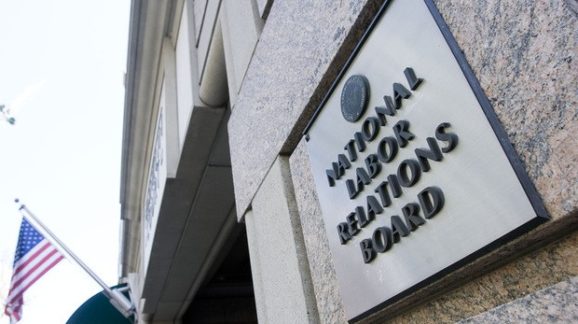Impasse over NLRB nominee may be just what unions want

The Senate Health, Education, Labor and Pensions (HELP) Committee yesterday approved one of President Trump’s nominees to serve on the National Labor Relations Board (NLRB), the main federal labor law enforcement agency, but tabled another. The upshot of this is that even if the full Senate confirms the nominee who made it out of committee, the NLRB will still lack a quorum to act for the foreseeable future. And that may be exactly what the labor movement wants.
Unions are attempting to do an end run around the NLRB, which has leaned rightward under the Trump administrations, by getting union-friendly states to take over its enforcement duties. Both California and New York in September passed laws allowing workers to file complaints with the state labor agencies if the NLRB is inactive.
Similar legislation has reportedly been introduced in Massachusetts, and it’s a sure bet that unions are lobbying lawmakers in other union-friendly states to do the same. The NLRB has sued New York over its law. The Board will likely also challenge California’s law, which passed last week.
The state laws would undermine the role of the NLRB, which was created to enforce the National Labor Relations Act and help ensure “labor peace” – i.e., more amicable relations between unions and management by creating a consistent set of rules for both sides. States could potentially give unions tremendous leverage in conflicts with management by changing the rules currently set down by the NLRB. Just having conflicting rules from region to region, for example, over which workers are eligible to organize, would create major logistical problems for interstate businesses. California’s law was heavily promoted by the Teamsters, who still represent many long-haul truckers.
Thursday’s committee vote makes such shenanigans a real possibility. The NLRB has five members who serve staggered five-year terms, but it only needs three to have a quorum to act. In recent years the NLRB has often lacked a quorum, largely because the Board is a low priority for senators.
The NLRB is once again in that situation, with only one member remaining: chairman David Prouty, a Biden appointee. The four remaining seats are vacant. (It’s also closed due to the ongoing government shutdown.) Trump fired former chairwoman Gwynne Wilcox, a Democratic appointee, earlier this year and Republican Marvin Kaplan’s term expired in August. The two remaining seats have been open since 2022 and 2024, respectively.
Trump’s nominees would have restored a quorum and headed off the state-level efforts. The lack of a quorum has left hundreds of regular NLRB cases in limbo, including dozens in which employers are challenging unions’ election victories. The Senate committee approved James Murphy, a former NLRB legal staffer, in a 12-11 vote, but a planned vote on Boeing lawyer Scott Mayer was called off. Missouri Senator Josh Hawley, a Republican, had clashed with Mayer in a prior hearing over a strike involving more than 3,200 Boeing machinists in the St. Louis area.
“They haven’t had a significant wage increase in years. They need to be able to afford to pay rent, to put food on the table for their families, and to get their health care. I mean, is your company going to do right by these workers?” Hawley asked. The Missouri senator has carved out a niche for himself as the GOP’s most pro-union member.
The committee might still take up Mayer’s nomination on a later date, though nothing has been scheduled. Even if he were confirmed, that would still only give the NLRB the bare majority needed to act. The administration would need to find two additional nominees to fill all remaining seats to better ensure that the state-level effort to usurp the NLRB is prevented.
The NLRB is an imperfect institution with a long history of flip-flopping in its approach based on who holds the White House and therefore gets to appoint its members. The nation could theoretically function without it by turning over the Board’s responsibilities entirely to the judiciary. For the time being, however, the more practical approach is to give the NLRB a full majority of members who understand both the law and free market principles.